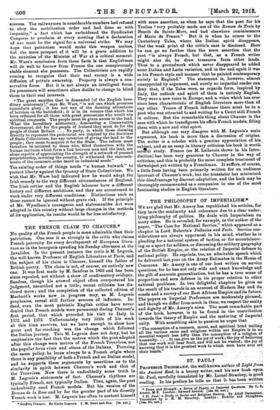THE PHILOSOPHY OF IMPERIALISM.*
WE are glad that Mr. Amery has republished his articles, for they have the continuity and coherence due to a clear under- lying philosophy of politics. He deals with Imperialism on many sides. He is revealed, for example, as the author of the paper, "The Case for National Service," which appeared as a chapter in Lord Roberts's Fallacies and Facts. Service con- siderations are always uppermost in his mind, whether he is pleading for a national system of tactics, or for mountaineer-, in g as a sport for soldiers, or discuising the military geography of the British Empire, or the relation of Imperial defence to national policy. He reprints, too, an admirable speech which he delivered last year on the Army Estimates in the Houie of Commons. Mr. Amery is one of our best writers on service questions, for he has not only wide and exact knowledge and the gift of accurate generalization, but he has a true sense of proportion and sees defence in its proper relation to other national problems. In two delightful chapters he gives us the result of his travels in an account of Hudson Bay and its coasts and a survey of our East African Empire and its future. The papers on Imperial Preference are moderately phrased, and though we differ from much in them, we respect the sanity and dignity of Mr. Amery's aims. The most remarkable part of the book, however, is to be found in the contribution towards the theory of Empire and the maturing of Imperial unity. With something akin to passion he urges that "The conception of a common, moral, and spiritual bond uniting all the various races and religions within our Empire is in no essential respect less lofty than the conception of a religion of humanity. . . . It can give us the joy of work ; the joy of believing that our work will bear fruit, and will not be wasted; the joy of knowing that it is the greatest work to which men have ever set their hands."














































 Previous page
Previous page